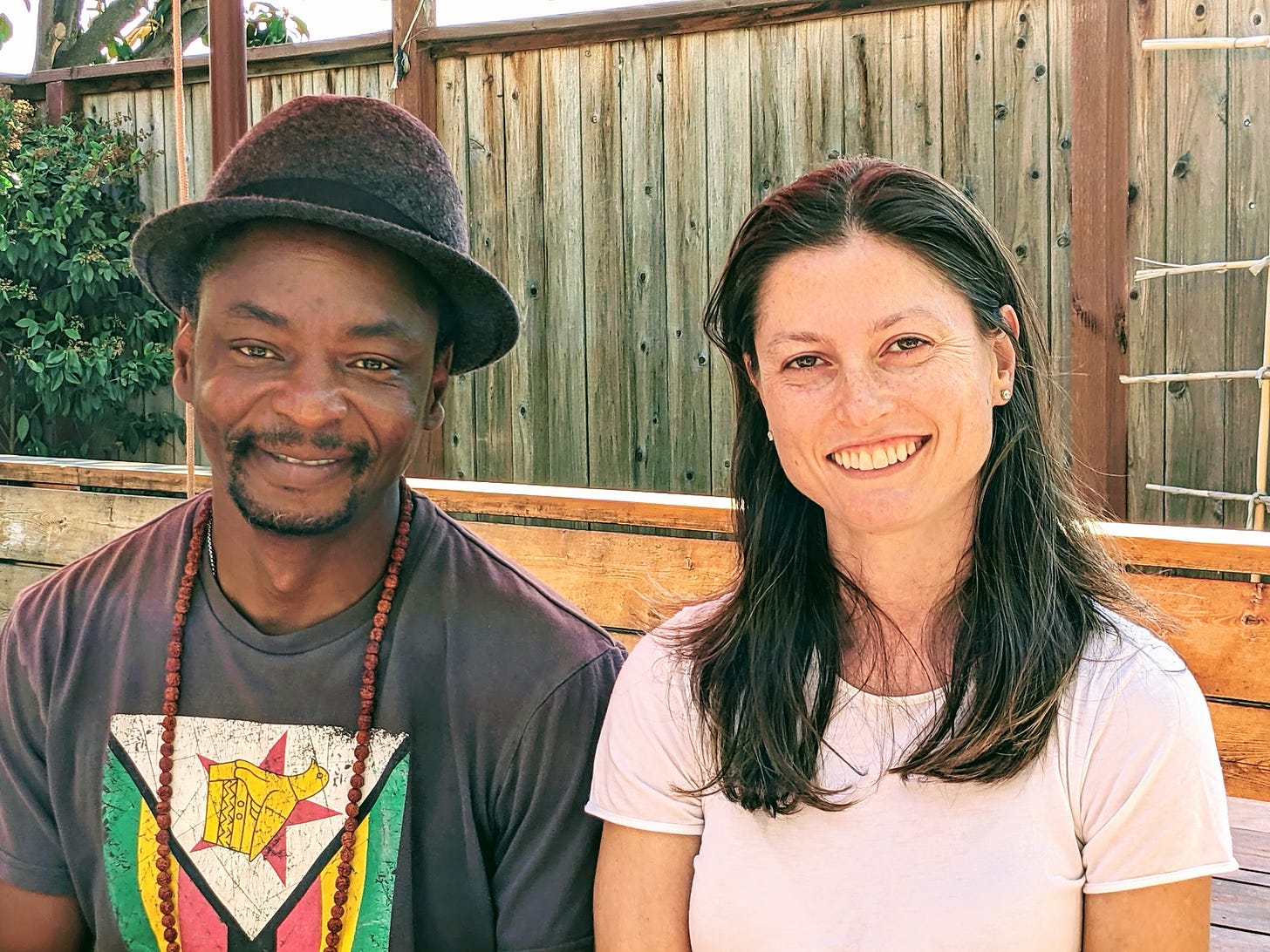Human stories: Victor Mavedzenge
A small ripple goes a long away
When Victor speaks, people listen. He has a way with words, an energy that inspires and motivates.
But charisma, in and of itself, isn’t something to admire. What really struck me about Victor is that he knows how to listen. When someone else is speaking, he exudes empathy and presence.
He really cares about what you have to say.
I interviewed Victor at Way Station Brew, my favorite coffee shop in Berkeley, for this inaugural storytelling piece. Victor’s story has an important message: a message about kindness, compassion, leadership, and service.
Some context
Victor and I first met at Downtown Streets Berkeley, an organization that helps the homeless. I was volunteering and Victor was the project manager. From the moment I met Victor, at the corner of 39th St and Adeline St, I knew he was a special person.
The setting was rather odd. We met outdoors due to Covid restrictions, and Victor was leading a team meeting. A big, loud tractor trailer truck drove by, just as Victor was mid-sentence. Instead of ignoring the obnoxious sound, and trying to talk over it, or getting agitated and off-kilter, Victor chose another way to respond: he turned towards the truck, smiled, and waved a friendly hello to the driver.
It became apparent to me that Victor leads by example. The outdoor meeting was not only for employees, but also for the homeless (the organization calls them “team members”). Victor’s interaction with the tractor trailer exemplified his way of being in and relating to the world. I’ll get into this in more detail later.
The soft touch
Victor is not one to wear heavy labels. He takes more of a soft-touch approach to life, meaning he elicits change by meeting the world where it is, rather than trying to force a round peg into a square hole.
When I asked Victor to tell me about himself, he identified himself with the following: first, as a father of two girls; second, as a visual artist; third, as a person who works in direct services; and fourth, as a Zimbabwean.
Service
My second time volunteering with Downtown Streets, I listened in on a self-talk workshop, where the discussion topics were mindset, attitude, and limiting beliefs.
The workshop took place in the community room of Berkeley’s food bank. The tables and chairs were arranged in a circle, so everyone could see each other. There was no pulpit. The environment felt meritocratic.
Victor stood behind one of the tables and, unexpectedly, announced to the group that he was leaving the organization due to personal reasons.
In true Victor style, he delivered a beautiful and inspiring farewell speech. One of the last things he said was,
Don’t be superhuman, be human, and that’s super.
And then, something extraordinary happened. One of the team members, “J.”, (full name omitted for privacy), a homeless man in his late 50s, who lives in a tent in downtown Berkeley, delivered a heartfelt, off-the-cuff, speech about Victor.
J., sitting back in his chair, looked and sounded cool, calm, and collected. He started by saying, “I would be so satisfied to know I touched someone’s life, how you did Victor.”
J., a former self-identified gangster, proceeded to deliver an immensely human speech. He said:
I want my mess to become my message.
I can’t change my mistakes but I can change what’s going on over here now.
He closed his speech with:
It’s important to have positive people in your life. I was too gangster before to cry. But that wasn’t even me. I wore masks. I thought I was too cool.
Everyone in the room shed some tears.
Drawing, bananas, and nudges
When I asked Victor to share some memories from Zimbabwe, he shared several.
The first: Victor was eight years old when he fell in love with drawing and realized he wanted to be an artist. His mom asked him to draw a picture - any picture. He drew a picture of his dad. I asked Victor what he loves about art. He said he loves not having to worry about his art being good or bad. Art just is. He flows when he makes art. He’s in the zone.
Another memory is of a woman selling bananas on the side of the road. Victor observed a transaction between the woman and a customer. There was a mixup and the woman offered to just give away 5 bananas -- for free. Victor told me, “She has so little, yet she is willing to give it away.” The encounter was so heartfelt and kind.
Victor shared a memory of Paul, his former boss at the Book Cafe in Zimbabwe. Victor greatly respected Paul’s leadership style. “Paul never told you what to do. If he saw you struggling on a task, he would just ask you to come to his office later so he can show you an easier way.”
Paul also taught Victor about the power of nudges and surrounding yourself with good people. One evening, after a long day at the Book Cafe, Paul told Victor that he saw, on the Internet, a scholarship opportunity for a fine arts masters program in London. The application submission deadline was that evening.
No way, Victor thought, this is crazy.
But Paul nudged him and he completed the application then and there, in Paul’s office. A few weeks later, he learned that he was accepted to the program with a scholarship!
America via London
After a brief few-year stint in London, where Victor completed his Masters degree in fine arts, he moved to California, in 2011. I asked him what his first impression was and he said:
The people here are nicer than in London.
He shared a story from San Diego, where he first moved after London:
I went to the movie theatre and had to wait in a queue. A gentleman behind me taps me on the shoulder and says, “Hey, how are you doing? I was so surprised. No one does that in London. Since that experience, I’ve traveled to other parts of the US and people in California are friendlier.”
After San Diego, Victor moved to Oakland, California. This was now his second cross-border move, so he was less anxious and overwhelmed than when he moved to London; but, America was nonetheless a foreign country, with a unique melting pot culture, and the move took some adjusting.
I asked Victor to share his first impressions of Oakland. He told me that he noticed the air always smelled musky, but he had no idea what it was. He was a boarding school kid and had never smelled marijuana before, he told me.
The second first impression that Victor shared, and a more serious one, was that all of the black people he saw were struggling. It was disheartening and he wanted to help.
Looking to the future
Victor told me his purpose is to serve.
When I asked him if he thinks that he’ll ever need more money, he responded that,
No, I don’t think I’ll need more money. Money is a tool -- a tool for serving others. Eventually, I may want to open my own wellness center.
In the meantime, Victor will be working at a wellness center in Hayward, not far from Berkeley where he currently lives. He hopes to bring more spirit to the wellness center by offering discussion groups, art classes, and poetry readings.
Like Victor, I believe that great change starts in your community. It takes one person to start a movement. I hope the effects of Victor’s message - kindness, compassion, leadership, and service - ripple into your life, and the lives of those whom you touch.
You can find Victor’s artwork here: https://mavedzenge.com/
Thank you to my Foster editors: Dani Trusca, Jordan Jones, Dan Vekhter, Lyle Mckeany ❤️
If you like this post, please let me know by tapping the heart button below, and maybe even leaving a comment. Dooo it :)




Thank you for sharing Victor's story, Rika! I feel like I know this person already just through your words 😍
Such a great story Rika. Thanks for sharing. A reminder that you don't need to do huge stuff to make a difference. Simple is super